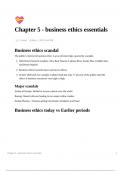Chapter 5 - business ethics essentials
Created @May 1, 2023 4:40 PM
Business ethics scandal
The public’s interest in business ethics is at an all-time high, spurred by scandals.
1. Wall Street financial scandals: AIG, Bear Stearns, Lehman Bros, Fannie Mae, Freddie Mac,
and Bernie Madoff
2. Business ethics has both macro and micro effects.
3. In their 2020 poll, for example, Gallup found that only 17 percent of the public rated the
ethics of business executives very high or high.
Major scandals
Airbus of Europe- Bribed to secure contacts over the world
Boeing- flawed software leading to two major airline crashes
Purdue Pharma - Felonies selling OxyContin: kickbacks and fraud
Business ethics today vs Earlier periods
Chapter 5 - business ethics essentials 1
, Examples of ethical issues today
Customers
- Product safety/healthfulness Advertising/marketing honestly
-Packaging fairly/accurately
-Labeling accurately/completely
-Pricing fairly relative to quality
-Protecting consumer privacy
Employees
- Fair compensation practices
- Fair day’s work and pay; living wage Compliance with employment laws
- Avoidance of employment discrimination Safe working conditions
Avoiding employee theft/embezzlement Protecting employees’ privacy
- Dealing with distracted employees
Community/environment
-Environmental protection/sustainability
-Adherence to legal mandates
Chapter 5 - business ethics essentials 2
, -Good corporate citizenship Philanthropy/supporting causes
-Adapting to foreign cultures
-Avoidance of bribery
-Stakeholder Group Examples of Ethical Issues
-Shareholders Protection of company assets
1) Basic concepts of business ethics
Ethics – are standards of conduct, which originate from some external group or source such as
society, in general, or business, in particular.
Morals – standards of conduct that originate within the individual. Morality, in this view, is often
viewed as one’s personal compass regard-ing right or wrong
Business Ethics
• Is concerned with rightness, wrongness, fairness or justice of actions, decisions, policies, and
practices that take place within a business context or in the workplace.
• Is the study of practices in organizations and is a quest to determine whether these practices are
acceptable or not.
Descriptive Ethics
• Involves describing, characterizing, and studying morality.
• Focuses on what is occurring.
Chapter 5 - business ethics essentials 3
, Descriptive ethics is concerned with describing, charac-terizing, and studying the
morality of people, an organiza-tion, a culture, or a society. It also compares and
contrasts different moral codes, systems, practices, beliefs, and val-ues.
In descriptive business ethics, the focus is on learning
what is occurring in the realm of behavior, actions, deci-sions, policies, and practices
of business firms, managers, or, perhaps, specific industries.
Public opinion polls frequently give us glimpses into descriptive ethics—what people
believe is going on as the basis of their perceptions and understandings.
Descriptive ethics focuses on “what is”—the prevailing set of ethical standards and
practices in the business commu-nity, specific organizations, or on the part of specific
man-agers.
The major danger in using descriptive ethics is that some people may adopt the view
that “if everyone is doing it,” it must be acceptable. Just because many employees are
participating in this questionable activity does not make it an acceptable practice.
This is why normative ethics is important.
Normative Ethics
• Focuses on what ought or should be occurring.
• Demands a more meaningful moral anchor than just “everyone is doing it.” Normative Ethics is
our primary concern in this text.
Chapter 5 - business ethics essentials 4




